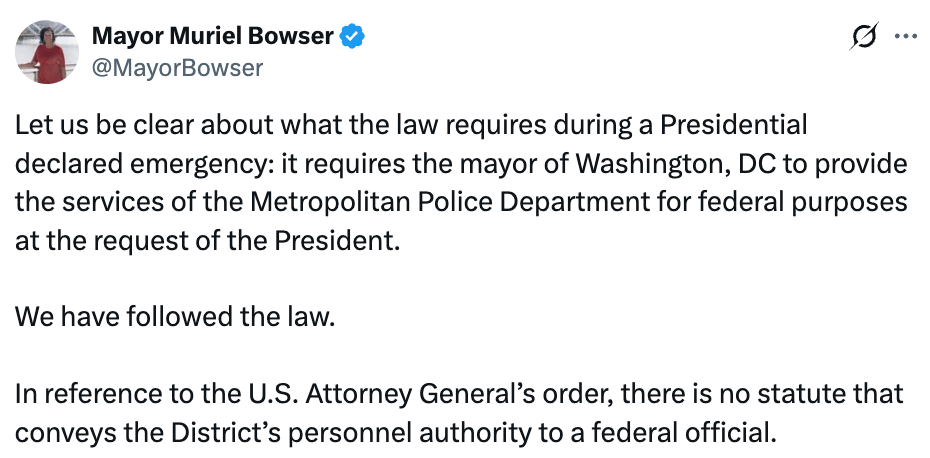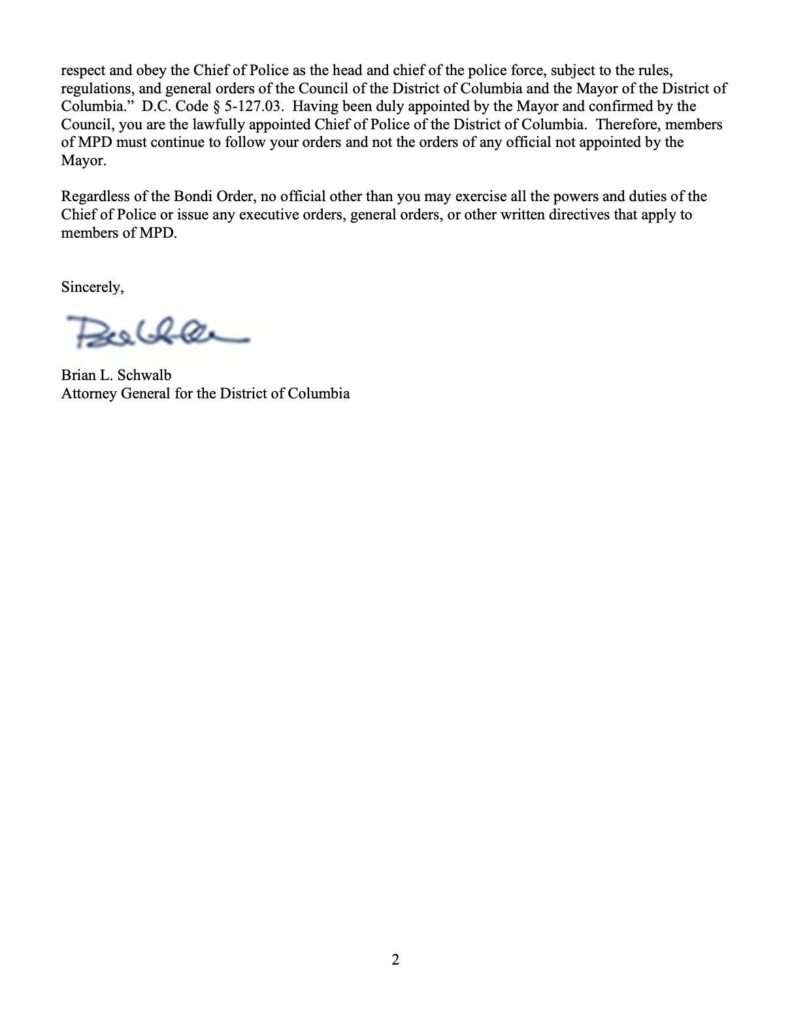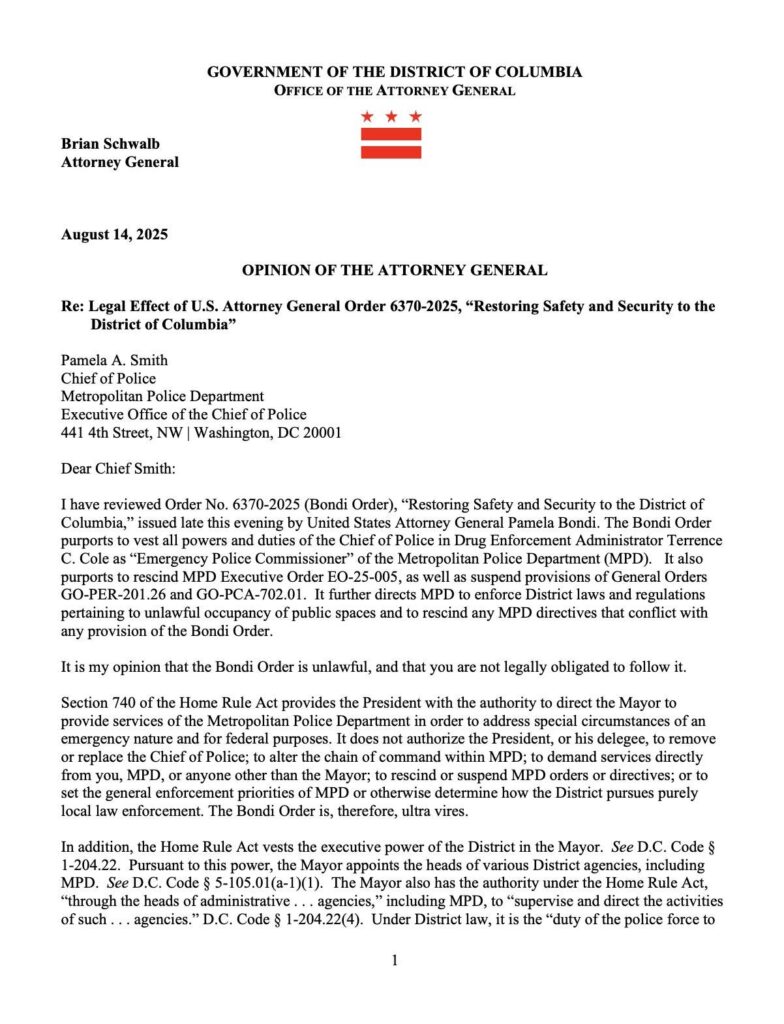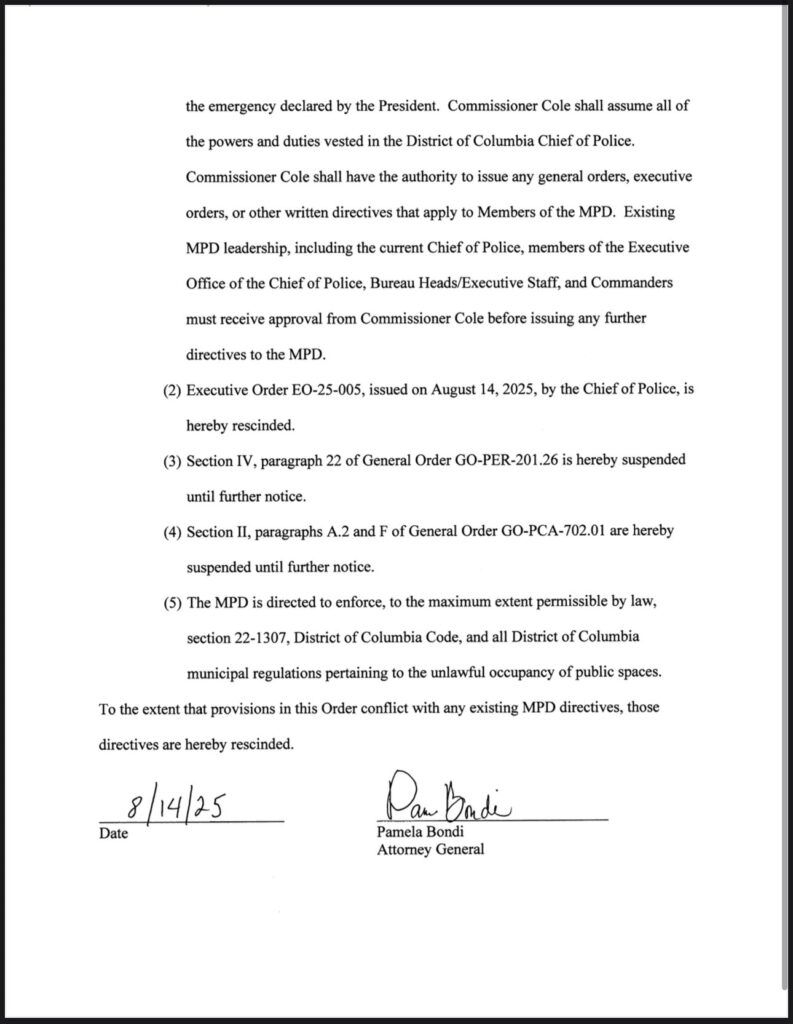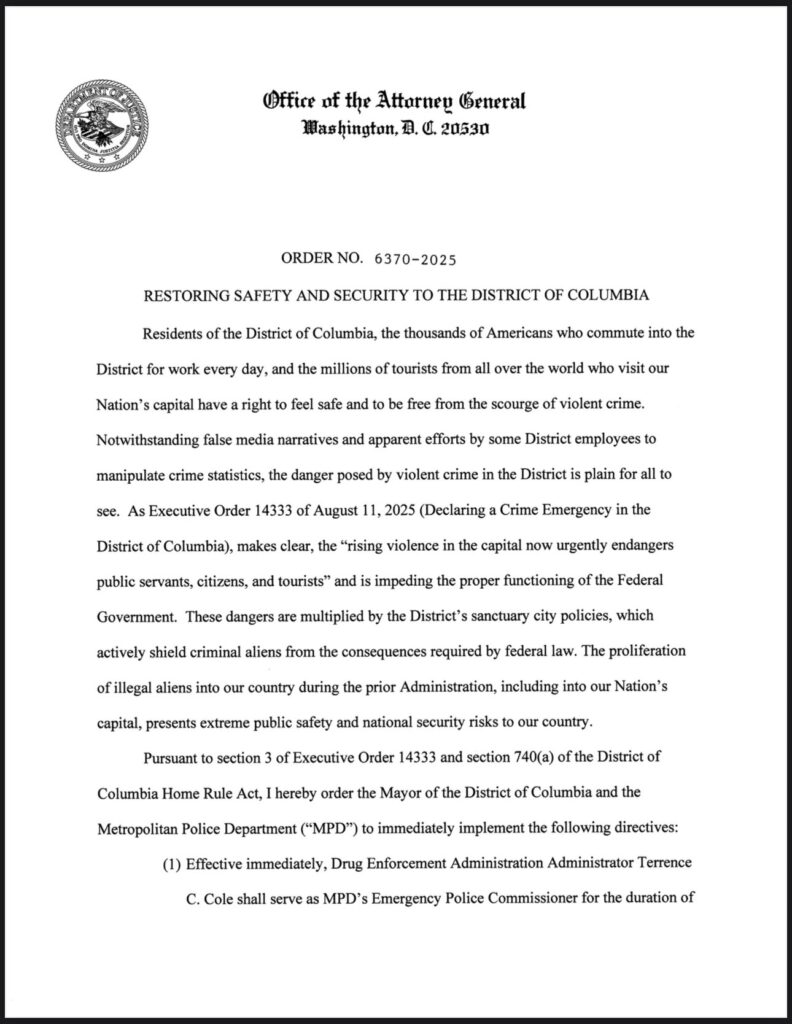Attorney General Pam Bondi issued an unprecedented order Thursday evening appointing Drug Enforcement Administration chief Terrence Cole as the District’s “emergency police commissioner,” stripping local control over the Metropolitan Police Department and rescinding sanctuary city protections.
The legality of Bondi’s action now poses a separate constitutional question.
In Order No. 6370-2025, titled “Restoring Safety and Security to the District of Columbia,” Bondi declared that Cole “shall assume all of the powers and duties vested in the District of Columbia Chief of Police”. The order requires that existing MPD leadership, including Chief Pamela Smith, “must receive approval from Commissioner Cole before issuing any further directives to the MPD.”
The directive also rescinds multiple local policies that limited cooperation with federal immigration enforcement, including Executive Order EO-25-005 issued earlier Thursday by Chief Smith, as well as provisions of General Orders that restricted immigration status inquiries and prevented arrests based solely on federal immigration warrants.
Bondi further mandated that D.C. police “enforce, to the maximum extent permissible by law, section 22-1307, District of Columbia Code, and all District of Columbia municipal regulations pertaining to the unlawful occupancy of public spaces.”
D.C. Attorney General Brian Schwalb responded within hours with a legal opinion addressed to Police Chief Smith, declaring Bondi’s order “unlawful” and advising that Smith is “not legally obligated to follow it.”
In his analysis, Schwalb argued that Section 740 of the Home Rule Act “does not authorize the President, or his delegee, to remove or replace the Chief of Police; to alter the chain of command within MPD; to demand services directly from you, MPD, or anyone other than the Mayor; to rescind or suspend MPD orders or directives; or to set the general enforcement priorities of MPD.”
“Therefore, members of MPD must continue to follow your orders and not the orders of any official not appointed by the Mayor,” Schwalb wrote, setting up a direct confrontation over the chain of command.
Mayor Muriel Bowser reinforced this position on social media, stating bluntly: “In reference to the U.S. Attorney General’s order, there is no statute that conveys the District’s personnel authority to a federal official.”
The District of Columbia filed a federal lawsuit Friday against President Donald Trump and his administration, challenging what officials call an unlawful “hostile takeover” of the Metropolitan Police Department that exceeds presidential authority under the Home Rule Act.
The 33-page complaint argues the federal actions violate the Administrative Procedure Act, exceed statutory authority, and breach constitutional separation of powers principles.
“By illegally declaring a takeover of MPD, the Administration is abusing its temporary, limited authority under the law,” Schwalb stated. “This represents the most severe threat to Home Rule that the District has ever encountered, and we are determined to combat it.”
The lawsuit seeks to vacate Bondi’s order, obtain preliminary and permanent injunctions blocking federal control, and secure declarations that the administration has exceeded its legal authority.
This is the first time any president has invoked Section 740 of the Home Rule Act to assume control over D.C.’s police force. The provision, enacted in 1973, allows the president to direct the mayor to provide police services “for Federal purposes” during “special conditions of an emergency nature” for up to 30 days.
However, legal experts emphasize that this authority has never been interpreted to allow wholesale replacement of local leadership or alteration of the department’s chain of command. The Home Rule Act was designed to grant D.C. residents limited self-governance after nearly two centuries of direct federal control, making the current federal intervention particularly significant.
A key driver of the federal intervention is the Trump administration’s desire to eliminate D.C.’s sanctuary city protections. The District enacted the Sanctuary Values Amendment Act of 2020, which limits local cooperation with federal immigration agencies.
The act prohibits D.C. from providing federal immigration agencies with office space for searches, limits interviews of detained individuals, and prevents transfers to immigration custody without judicial warrants. Bondi’s order explicitly rescinds policies that “limit inquiries into immigration status and prevent arrests based solely on federal immigration warrants.”
The Home Rule Act limits presidential control of D.C. police to 30 days without congressional approval. Trump has indicated he may seek to extend this period or declare additional emergencies to maintain control.
Trump justified the federal takeover by claiming Washington faces a crime emergency, stating the city is “totally out of control” and describing it as “one of the most dangerous cities anywhere in the world”. However, official crime statistics paint a different picture.
According to the Metropolitan Police Department’s latest data, violent crime in DC is down 26% in 2025 compared to the same period in 2024. The Department of Justice reported in January that violent crime for 2024 was down 35% from 2023 and was at its lowest level in over 30 years. Homicides have decreased 12% in 2025 compared to 2024, with 100 homicides recorded this year versus 113 during the same period last year.
At a Kennedy Center press conference, Trump was questioned about the 30-day window for requesting federal assistance from the DC police.
Trump responded: “Well, if it’s a national emergency, we can do it without Congress, but we expect to be to Congress — before Congress very quickly. And again, we think the Democrats will not do anything to stop crime, but we think the Republicans will do it almost unanimously. So, we’re going to need a crime bill that we’re going to be putting in and it’s going to pertain initially to DC. It’s almost — we’re going to use it as a very positive example.”
The operations have expanded from evening-only patrols to 24/7 coverage throughout all seven districts in Washington. Federal agencies participating include the FBI, DEA, U.S. Marshals Service, Homeland Security Investigations, and multiple other agencies working alongside the federalized Metropolitan Police Department.
Trump has suggested the DC operation could serve as a template for federal intervention in other Democratic-led cities, specifically mentioning New York, Chicago, and Los Angeles.
The Constitution reserves police powers to individual states under the Tenth Amendment, making federal intervention in local law enforcement constitutionally problematic.
States possess “co-equal and territorially limited sovereignty” that prevents the federal government from unilaterally assuming control of state and local governmental functions. This principle means that any federal attempt to take over police departments in New York, Chicago, Los Angeles, or Baltimore would face immediate constitutional challenges based on state sovereignty grounds.
